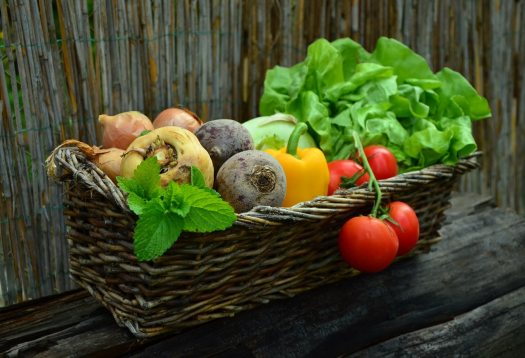It turns out that the bacteria in your digestive tract, or your gut, can make you sad.
The good news is that it can also make you happy!

**image courtesy of Flickr**
Researchers have hypothesized for a while that gut function can influence your mood and sleep, among other things, and your gut is frequently referred to as the second brain.
I’m going to take a second to help you break this down and understand how you can improve your gut function, and feel happier, without having to resort to medications and supplementation.
Feeling down?
Researchers performed a 10-week study with 44 adults who were either given a placebo, or a probiotic, Bifidobacterium longum NCC3001 (BL), for 6 weeks.
Participants were evaluated on levels of anxiety, depression, IBS symptoms, quality of life, and somatic symptoms via questionnaire at weeks 0, 6, and 10.
At week 4, 64% of BL participants reported a reduction in depression score and an increase in quality of life, whereas 32% reported similar scores in the placebo group.
How about something more objective?
fMRI analysis showed reduced responses to negative emotional stimuli in the amygdala and fronto-limbic regions when compared to the placebo group. These areas are a part of the brain responsible for response to and memory of emotions, especially fear.
Th take-away?
Feeling down? Fix your gut. Take some probiotics. Be aware, though, that your diet will be the biggest factor influencing long-term success or failure of probiotic supplementation.
If you continue to eat like crap, you’re going to keep feeling like crap.
How does my diet influence my gut?
Here’s one example. Researchers found that diets that were higher in dietary resistant starch — fiber — improved the variety of bacteria in the gut and enhanced production of short chain fatty acids (SCFAs). SCFAs have been linked to reduced risk of inflammatory diseases, diabetes, and cardiovascular disease.
These researchers also found that high fiber intake also (1) improved gut barrier function — meaning that the gut is absorbing the right things and keeping the wrong things out –, (2) increased gut peptides — hormones that signal various digestive functions — which improve blood sugar control and fat metabolism, (3) mimics the effects of caloric restriction, and (4) up-regulates genes involved in xenobiotic metabolism — how the body processes chemical compounds like drugs, pesticides, or carcinogens.
**image courtesy of Pixabay**
Let’s take that a step further. What’s really going on?
Fiber feeds the beneficial bacteria in your gut. When breaking down food, good gut bacteria produce byproducts that nourish the lining of your intestinal tract. This beneficial bacteria also produces compounds that increase the number of regulatory T cells, which help to prevent unnecessary autoimmune responses.
Bad gut bacteria don’t produce the same byproducts, and may even produce byproducts that are toxic for your body. Without nourishing your gut lining, substances like these toxins, bacteria, and undigested food pass into your blood stream, leading to more inflammation.
This is called Leaky Gut Syndrome, and is associated with a higher risk for inflammatory diseases, type 2 diabetes, heart disease, stroke, and cancer, just to name a few things.
Gross.
Insoluble fiber is passed through your body undigested and acts as a vehicle for packaging and vacating toxins from the body. This is the one that helps you maintain regular bowel movements.
Soluble fiber is converted to short-chain fatty-acids via fermentation in the gut, nourishing good bacteria, and serving as an efficient fuel source for your cells.
Soluble fiber also acts as an anti-nutrient, as it reduces the absorption of carbohydrates and assists in controlling glucose and insulin. It slows digestion, leaving you more full for a longer period of time, and leading to that slower uptake of glucose.
Insoluble and soluble fiber work together to form a barrier in the intestine that can also protect the liver.
Diets that are higher in fiber have been shown to reduce cholesterol and blood pressure, improve insulin sensitivity, and reduce inflammation.
I want to feel happy!

**image courtesy of automnenoble bogomolov**
Let’s talk about having a healthy gut!
Healthy gut, happy guy (or gal)!
As I’ve discussed with micro and macronutrients in the past, high fiber foods usually contain a combination of multiple sources: both soluble and insoluble fiber.
As a disclaimer, you may want to slowly ramp your way up to these levels in order to avoid constipating yourself.
That’s not fun.
First, track your food for a few days to see where your fiber intake really is. Don’t just guess.
Second, you’ll want to ramp up to consuming between 25-50 grams of fiber per day from sources like (soluble) cucumbers, berries, beans, nuts, (insoluble) green leafy vegetables, green beans, celery, and others.
Yes, you can supplement with probiotics, but be aware that this is a short-term fix, and you’ll lose those benefits shortly after discontinuing supplementation and/or returning to a non-nourishing diet.
Just like everything we’ve discussed in the past, it’s up to you to experiment and figure out what level of fiber intake you feel the best at. More is not always better.
Lastly, if you really really want to make this work, but you’re struggling to make a change, you may want to consider working with a coach. The hardest part is making changes that fit you, in your lifestyle, and sticking with it over the long-term.
You live in real life. Not some fantasy land where it’s easy to make long-term changes to how you’ve done things for the past 30 years.
It you want that kind of help, give me a call at 847.807.5361.
The time is free, and it’s on me.
If calling is not your thing, shoot me a text or an email.
Lastly (really this time), I’m not a doctor. This is not medical advice. I’m just a nerd who likes to read research, and this is my way of sharing that with the world.
I read it so you don’t have to.
-RB3
P.S. If you have questions, leave them in the comments, send me a DM, or shoot me a text! I’ll answer them directly, or in a future post if that’s what you’re looking for.

